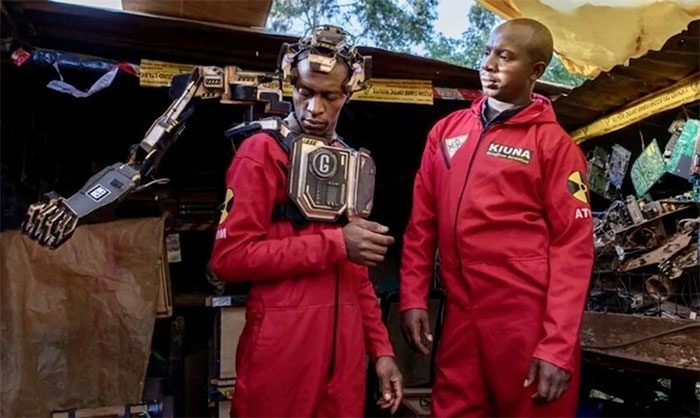In a world of ever-evolving technology, the increasing use of electronic devices means that electronic waste is also piling up. There are many ideas for recycling this waste, one of which comes from the distant country of Kenya, where innovative technology has not yet received proper attention.
The makeshift laboratory, located in the suburbs of Nairobi (Kenya), is run by two “self-taught inventors”, Moses Kiuna, 29, and his cousin David Gathu, 30, who have nurtured the idea of recycling electronic waste into prosthetic limbs for real people.

Kenyan inventors David Gathu (left) and Moses Kiuna have created prosthetic arms from electronic waste. (Photo: AFP).
Using discarded parts from electronic devices, this duo created their first prosthetic arm in 2012 after witnessing a neighbor tragically lose an arm in a workplace accident. To date, they confidently assert that their latest prosthetic version has significant improvements over the original.
The receiver from old headphones is repurposed by the two inventors (who have never received formal education) to capture signals from the brain and convert them into electric currents before sending them through a transmitter to control the movement of the arm as desired by the user. The process from thought to action takes just two seconds.
Sharing their motivation, the Kenyan brothers revealed that witnessing people with disabilities struggle with daily activities inspired them to do something to make life easier for these individuals. The first prosthetic arm they created was based on the wishes of their neighbor, helping him to manage household tasks independently.
In reality, the cost of prosthetic devices is quite high, making the accessibility rate for people with disabilities around the world only about 10%. The World Health Organization (WHO) has also warned that the scarcity of individuals in need of access to and use of prosthetic devices further burdens those with disabilities. A similar situation exists in Kenya, where the high import costs of prosthetic components exacerbate the issue.
Faced with this reality, Gathu and Kiuna constantly ask themselves what they can do to help their fellow Kenyans. They found their answer in scrap yards. Even during their school years, the two would wander around various scrap yards in Nairobi to search for discarded electronic devices to recycle into creative products.
Despite traditional education being too “narrow” for their curiosity, Gathu dropped out of school at 17 while Kiuna also left his university program; however, they did not abandon their passion for learning and exploration. This determination is evident in their makeshift lab, where two portraits of the great scientist Albert Einstein hang. The lab’s shelves are packed with scientific books, and the walls, made from metal sheets, are adorned with anatomical diagrams and the circulatory system.
To create the prosthetic arms, they have taught themselves about neurophysiology by reading books and consulting with doctors for clearer explanations of technical terms.
The prosthetic arm is just one of the many inventions by the Kenyan duo. During the COVID-19 pandemic, they developed a device for disinfecting banknotes using infrared technology, followed by a green energy generator that converts oxygen into electrical energy, contributing to the fight against climate change.
Mukuria Mwangi, the founder of the Jasiri Mugumo school in Nairobi, believes that Gathu and Kiuna have demonstrated that Africans can make significant contributions to technology and science. Mwangi frequently invites both to teach and inspire children at the school, instilling hope in the younger generation of Kenya.
Innovation is essential for fostering future development, but Kenya lacks the educational and financial resources to nurture talent in this field. This reality is reflected in the dust covering piles of projects and inventions in Gathu and Kiuna’s lab. Both have stated that they do not lack feasible commercial ideas, but rather funding and support, yet they remain hopeful that one day, their prosthetic arms and inventions will lead to a thriving business in the future.



















































